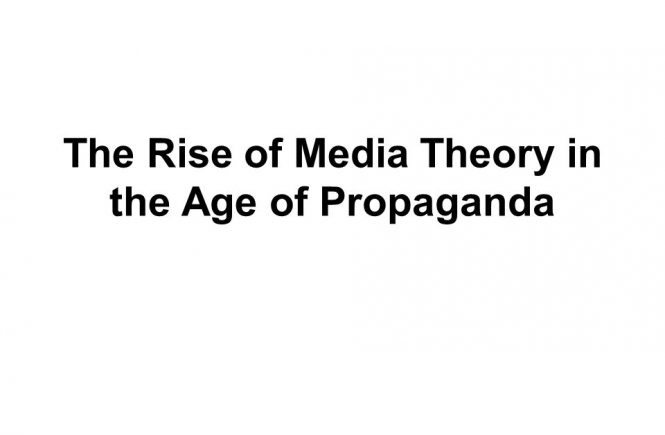MASS COMMUNICATION THEORY Foundations, Ferment, and Future (Book) Chapter#4: THE RISE OF MEDIA THEORY IN THE AGE OF PROPAGANDA (Review) Muckraker Crusading journalist, typically challenging the powerful on behalf of those less so. Propaganda No-holds-barred use of communication to propagate specific beliefs and expectations. White propaganda Intentional suppression of potentially harmful information and ideas, combined with deliberate promotion of positive information or ideas to distract attention from problematic events. Propaganda theorists abandoned idealism in favor of strategies they regarded as realistic and scientific. Propaganda must be resisted by whatever means possible. Even though the threat of propaganda was great, there might be a silver lining to this cloud. If we could find a way to harness the power of propaganda to promote good and just ideals, then we would not only survive its threat but have a tool to help build a better social order. This was the promise of […]
LIBERTARIANISM REBORN Propaganda
LIBERTARIANISM REBORN Propaganda By the end of the 1930s, pessimism about the future of democracy was widespread. Most members of the old-line elites were convinced that totalitarianism couldn’t be stopped. They pointed to theories like those of Lasswell and Lippmann as proofthat average people could not be trusted. The only hope for the future lay with technocracy and science. In the next chapter, we will trace the development of theories that arose in opposition to these technocratic views. Advocates of these emerging ideas didn’t base their views of media on social science; rather, they wanted to revive older notions of democracy and media. If modern democracy was being threatened, then maybe the threat was the result of having strayed too far from old values and ideals. Perhaps these could be restored and modern social institutions could somehow be purified and renewed. Theorists sought to make the Libertarianism of the Founding […]
MODERN PROPAGANDA THEORY
MODERN PROPAGANDA THEORY Consider the Hippler and Sproule characterizations of propaganda from earlier in this chapter: simplify a complex issue and repeat that simplification; use covert, massively orchestrated communication; and use tricky language to discourage reflective thought. Some contemporary critical theorists argue that propaganda conforming to these rules is alive and well today and that it is practiced with a stealth, sophistication, and effectiveness unparalleled in history. They point to a number of “natural beliefs” that have been so well propagandized that meaningful public discourse about them has become difficult if not impossible. Political discourse and advertising are frequent areas of modern propaganda study, and the central argument of this modern propaganda theory is that powerful elites so thoroughly control the mass media and their content that they have little trouble imposing their Truth on the culture. Close your eyes and think welfare. Did you envision large corporations accepting government […]
THE INSTITUTE FOR PROPAGANDA ANALYSIS
Should the power of propaganda be used for democratic ends (the Lasswell/Lippmann view), or because propaganda, by its very existence, was antidemocratic, was education the best way to deal with it (the Dewey view)? The disagreement over the proper place of propaganda in a democracy was no theoretical exercise. Social scientists believed the fate of the country, the world in fact, rested on its outcome. In 1937, the threat of external propaganda was so great that a group of social scientists, journalists, and educators founded the Institute for Propaganda Analysis with the goal of orchestrating a nationwide educational effort to combat its effects. During the four years of its existence, the institute was quite productive, generating numerous pamphlets, books, and articles explaining how propaganda works (read more about propaganda techniques in the box entitled “Applying the Seven Propaganda Techniques”). The institute was successful in developing an antipropaganda curriculum adopted by […]
HAROLD LASSWELL’S PROPAGANDA THEORY
Lasswell’s theory of propaganda blended ideas borrowed from behaviorism and Freudianism into a particularly pessimistic vision of media and their role in forging modern social orders. Lasswell was one of the first political scientists to recognize the usefulness of various psychological theories and to demonstrate how they could be applied to understanding politics. The power of propaganda was not so much the result of the substance or appeal of specific messages but, rather, the result of the vulnerable state of mind of average people. This state of mind can be assessed using psychological theories. Lasswell argued that economic depression and escalating political conflict had induced widespread psychosis, and this made most people susceptible to even crude forms of propaganda. When average people are confronted daily by powerful threats to their personal lives, they turn to propaganda for reassurance and a way to overcome the threat. In Lasswell’s view, democracy has […]
FREUDIANISM IN PROPAGANDA
Freudianism, on the other hand, was very different from behaviorism, though Sigmund Freud shared Watson’s skepticism concerning people’s ability to exercise effective conscious or rational control over their actions. Freud spent considerable time counseling middle-class women who suffered from hysteria. During hysterical fits, seemingly ordinary individuals would suddenly “break down” and display uncontrolled and highly emotional behavior. It was not uncommon for quiet and passive women to “break down” in public places. They would scream, have fits of crying, or become violent. Often these outbursts occurred at times when the likelihood of embarrassment and trouble for themselves and others was at its highest. What could be causing this irrational behavior? To explain hysteria, Freud reasoned that the self that guides action must be fragmented into conflicting parts. Normally one part, the rational mind, or Ego, is in control, but sometimes other parts become dominant. Freud speculated that human action is […]
